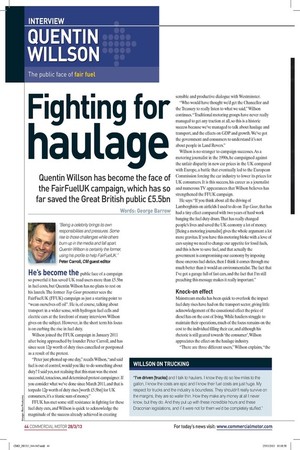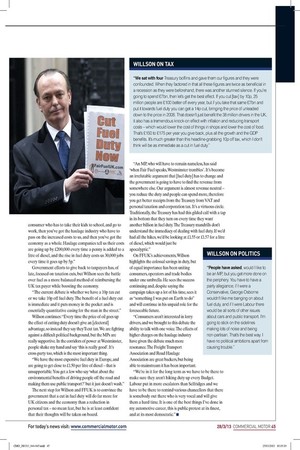Fighting for haula e Quentin Willson has become the face
Page 30

Page 31

If you've noticed an error in this article please click here to report it so we can fix it.
of the FairFuelUK campaign, which has so far saved the Great British public £5.5bn Words: George Barrow "Being a celebrity brings its own responsibilities and pressures. Some rise to those challenges while others burn up in the media and fall apart. Quentin Willson is certainly the former using his profile to help FairFuelUK." Peter Carroll, CM guest editor He's become the — public face of a campaign so powerful it has saved UK road users more than £5.5bn in fuel costs, but Quentin Willson has no plans to rest on his laurels. The former Top Gear presenter sees the FairFuelUK (I,I,UK) campaign as just a starting point to "wean ourselves off oil". He is, of course, talking about transport in a wider sense, with hydrogen fuel cells and electric cars at the forefront of many interviews Willson gives on the subject. However, in the short term his focus is on curbing the rise in fuel duty.
Willson joined the FFUK campaign in January 2011 after being approached by founder Peter Carroll, and has since seen 12p worth of duty rises cancelled or postponed as a result of the protest.
"Peter just phoned up one day," recalls Willson, "and said fuel is out of control, would you like to do something about duty? I said yes, not realising that this man was the most successful, tenacious, and determined protest campaigner. If you consider what we've done since March 2011, and that is torpedo 12p worth of duty rises [worth £5.5bn] for UK consumers, it's a titanic sum of money."
1,I,UK has met some stiff resistance in fighting for these fuel duty cuts, and Willson is quick to acknowledge the magnitude of the success already achieved in creating sensible and productive dialogue with Westminster "Who would have thought we'd get the Chancellor and the Treasury to really listen to what we said," Willson continues. "Traditional motoring groups have never really managed to get any traction at all, so this is a historic success because we've managed to talk about haulage and transport, and the effects on GDP and growth. We've got the government and consumers to understand it's not about people in Land Rovers."
Willson is no stranger to campaign successes. As a motoring journalist in the 1990s, he campaigned against the unfair disparity in new car prices in the UK compared with Europe, a battle that eventually led to the European Commission forcing the car industry to lower its prices for UK consumers. It is this success, his career as a journalist and numerous TV appearances that Willson believes has strengthened thel,I,UK campaign.
He says: "If you think about all the driving of Lamborghinis on airfields I used to do on Top Gear, that has had a tiny effect compared with two years of hard work banging the fuel duty drum. That has really changed people's lives and saved the UK economy a lot of money. [Being a motoring journalist] gives the whole argument a lot more gravitas. If you have this motoring bloke with a love of cars saying we need to change our appetite for fossil fuels, and this is how to save fuel, and that actually the government is compromising our economy by imposing these onerous fuel duties, then I think it comes through me much better than it would an environmentalist. The fact that I've got a garage full of fast cars, and the fact that I'm still preaching this message makes it really important."
Knock-on effect Mainstream media has been quick to overlook the impact fuel duty rises have had on the transport sector, giving little acknowledgement of the causational effect the price of diesel has on the cost of living. While hauliers struggle to maintain their operations, much of the focus remains on the cost to the individual filling their car, and although his rhetoric is still geared towards 'the consumer',Willson appreciates the effect on the haulage industry.
"There are three different users," Willson explains, "the consumer who has to take their kids to school, and go to work, then you've got the haulage industry who have to pass on the increased costs to us, and then you've got the economy as a whole. Haulage companies tell us their costs are going up by £200,000 every time a penny is added to a litre of diesel, and the rise in fuel duty costs us 30,000 jobs every time it goes up by Sp."
Government efforts to give back to taxpayers has, of late, focused on taxation cuts, but Willson sees the battle over fuel as a more balanced method of reimbursing the UK tax payer while boosting the economy.
"The current debate is whether we have a 10p tax cut or we take 10p off fuel duty. The benefit of a fuel duty cut is immediate and it puts money in the pocket and is essentially quantitative easing for the man in the street."
Willson continues: "Every time the price of oil goes up the effect of cutting duty doesn't give an [electoral] advantage, so instead they say they'll cut tax. We are fighting against a difficult political background, but the MPs are really supportive. In the corridors of power at Westminster, people shake my hand and say 'this is really good'. It's cross-party too, which is the most important thing "We have the most expensive fuel duty in Europe, and are going to get close to £1.50 per litre of diesel — that is unsupportable. You get a few who say 'what about the environmental benefits of driving people off the road and making them use public transport?' but it just doesn't wash."
The next step for Willson and1,1,UK is to convince the government that a cut in fuel duty will do far more for UK citizens and the economy than a reduction in personal tax — no mean feat, but he is at least confident that their thoughts will be taken on board. "AniVIE who will have to remain nameless, has said 'when Fair Fuel speaks, Westminster trembles'. It's become an irrefutable argument that [fuel duty] has to change and the government is going to have to find the revenue from somewhere else. Our argument is almost revenue neutral — you reduce the duty and people can spend more, therefore you get better receipts from the Treasury from VAT and personal taxation and corporation tax. It's a virtuous circle. Traditionally, the Treasury has had this gilded calf with a tap in its bottom that they turn on every time they want another billion in fuel duty. The Treasury mandrills don't understand the immediacy of dealing with fuel duty. If we'd had all the hikes, we'd be looking at £155 or £1.57 for a litre of diesel, which would just be apocalyptic."
On1,I,UK's achievements, Willson highlights the colossal savings in duty, but of equal importance has been uniting consumers, operators and trade bodies under one umbrella. He sees the success continuing and, despite saying the campaign takes up a lot of his time, sees it as "something I was put on Earth to do" and will continue in his unpaid role for the foreseeable future.
"Consumers aren't interested in lorry drivers, and we brought to this debate the ability to talk with one voice. The effects of higher charges on the haulage industry have given the debate much more resonance. The Freight Transport Association and Road Haulage Association are great backers, but being able to mainstream it has been important.
"We're in it for the long term as we have to be there to make sure they aren't hiking duty up every Budget. Labour put in more escalators than Selfridges and we have to be there to remind various chancellors that there is somebody out there who is very vocal and will give them a hard time. It is one of the best things I've done in my automotive career, this is public protest at its finest, and at its most democratic." • WILLSON ON TRUCKING "I've driven [trucks] and I talk to hauliers. I know they do so few miles to the gallon, I know the costs are epic and I know their fuel costs are just huge. My respect for trucks and the industry is boundless. They shouldn't really survive on the margins, they are so wafer thin. How they make any money at all I never know, but they do. And they put up with these incredible hours and these Draconian legislations, and if it were not for them we'd be completely stuffed." WILLSON ON TAX "We sat with four Treasury boffins and gave them our figures and they were confounded. When they factored in that all these figures are twice as beneficial in a recession as they were beforehand, there was another stunned silence. If you're going to spend £7bn, then let's get the best effect. If you cut [tax] by 10p, 25 million people are £100 better off every year, but if you take that same E7bn and put it towards fuel duty you can get a 14p cut, bringing the price of unleaded down to the price in 2008. That doesn't just benefit the 38 million drivers in the UK, it also has a tremendous knock-on effect with inflation and reducing transport costs — which would lower the cost of things in shops and lower the cost of food. That's £150 to £175 per year you give back, plus all the growth and the GDP benefits. It's much greater than this headline-grabbing 10p off tax, which I don't think will be as immediate as a cut in fuel duty."
WILLSON ON POLITICS "People have asked, would I like to be an MP, but you get more done on the periphery. You have to have a party allegiance; if I were a Conservative, George Osborne wouldn't like me banging on about fuel duty, and if I were Labour there would be all sorts of other issues about cars and public transport. I'm going to stick on the sidelines making lots of noise and being non-partisan. That's the best way. I have no political ambitions apart from causing trouble."









































